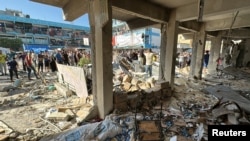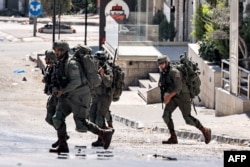Israeli airstrikes in Gaza overnight and into Wednesday hit a U.N. school sheltering displaced Palestinian families and two homes, killing at least 34 people, including 19 women and children, authorities reported.
The deadliest strike, on Wednesday afternoon, hit the U.N.'s Al-Jaouni Preparatory Boys School in central Gaza's Nuseirat refugee camp, killing 14 and wounding at least 18. The Israeli military said its intention was to hit Hamas militants planning attacks from inside the school.
Six staff members of UNRWA, the U.N. agency for Palestinians, which also operates the school, were among those killed in the strike on the school.
"This is the highest death toll among our staff in a single incident," the agency posted on X, formerly Twitter. "Schools and other civilian infrastructure must be protected at all times, they are not a target."
U.N. Secretary-General Antonio Guterres decried the bombing of the U.N. school. In a post on X, he wrote, "What’s happening in Gaza is totally unacceptable ... These dramatic violations of international humanitarian law need to stop now."
At least 220 UNRWA staff have been killed since the beginning of the war.
Philippe Lazzarini, UNRWA’s chief, also said on X, "Humanitarian staff, premises & operations have been blatantly & unabatedly disregarded since the beginning of the war. The longer impunity prevails, the more international humanitarian law & the Geneva conventions will become irrelevant."
One of the children killed was the daughter of Momin Selmi, a member of Gaza's civil defense agency, which works to rescue the wounded and retrieve bodies after strikes, the agency said in a statement.
Tens of thousands of Palestinians driven from their homes by Israeli military offensives and evacuation orders have been living in Gaza's schools. The al-Jaouni school, one of many in Gaza run by the U.N. agency for Palestinians, has been hit several times over the course of the war, now in its 12th month.
Israel frequently bombs schools, saying they are being used by Hamas militants. It blames Hamas for the civilian casualties from its strikes, saying its fighters base themselves and operate within dense residential neighborhoods.
More than 90% of Gaza's school buildings have been severely or partially damaged in strikes, and more than half the schools housing displaced people have been hit, according to a survey in July by the Education Cluster, a collection of aid groups led by UNICEF and Save the Children.
In another attack earlier Wednesday, a strike hit a home near the southern Gaza city of Khan Younis, killing 11 people, including six brothers and sisters.
A strike late Tuesday on a home in the urban Jabaliya refugee camp in northern Gaza killed nine people, including six women and children, according to the Gaza health ministry and the civil defense.
The war started with the shock Hamas attack on southern Israel last October that killed 1,200 people and led to the capture of about 250 hostages. Israel’s subsequent counteroffensive has killed more than 41,000 Palestinians in Gaza, mostly women and children, although the Israeli military says the death toll includes thousands of militants.
Hamas has been designated a terror group by the United States, United Kingdom, European Union and others.
Meanwhile, Israel’s military said Wednesday one of its helicopters crashed in the southern Gaza Strip, killing two Israeli soldiers and injuring seven others.
A preliminary investigation indicated the crash was not caused by enemy fire. The helicopter went down during a mission to evacuate an injured soldier in the Rafah area.
In the West Bank, an Israeli airstrike on Wednesday killed at least five people in the city of Tubas, according to Palestinian emergency officials.
The Israeli military reported conducting a strike targeting an “armed terrorist cell” in the same area.
In another part of the West Bank, the Palestine Red Crescent Society said Israeli forces detained five of the group’s emergency responders. The group said the personnel were transporting a patient and evacuating several children from the Tulkarm refugee camp when the detentions took place.
Other Israeli strikes Wednesday targeted rocket launchers and other sites used by Hezbollah militants in southern Lebanon, as fears persist of a wider conflict in the region.
Death of an American
After the Israeli military acknowledged its fire probably killed a U.S. citizen activist in the occupied West Bank, U.S. Secretary of State Antony Blinken on Tuesday called on Israel to make "fundamental changes" in its actions in the territory.
Blinken called the killing of Turkish American activist Aysenur Ezgi Eygi "unprovoked and unjustified."
"No one, no one should be shot and killed for attending a protest. No one should have to put their life at risk just for freely expressing their views," he said.
The Israel Defense Forces said, “Clearly, this has been a terrible mistake, and it is investigating the issue fully.”
President Joe Biden called it an "accident." Vice President Kamala Harris, the Democratic nominee for president in the November presidential election, said, “The killing of Aysenur Eygi is a horrific tragedy that never should have happened.”
The Pentagon said late Tuesday that Defense Secretary Lloyd Austin discussed Eygi’s death in a phone call with Israeli Defense Minister Yoav Gallant. Austin urged Gallant to reexamine Israel’s “rules of engagement while operating in the West Bank,” the Pentagon said.
Eygi was shot in the head during a pro-Palestinian demonstration in the occupied West Bank last week.
Cease-fire effort
Blinken said Tuesday that the United States will continue working with Qatar and Egypt to bridge remaining gaps in a cease-fire deal to end the conflict in Gaza as soon as possible.
"More than 90% of the issues have been agreed, so we're down to a handful of issues, not even a handful of issues that are hard but fully resolvable in our judgment," Blinken told reporters during a joint news conference in London with British Foreign Secretary David Lammy.
Lammy, who recently returned from the United Arab Emirates, said the UAE is "showing some forward-leaning in their commitment" to security guarantees in post-war Gaza. He stressed the need for a pathway to a two-state solution, emphasizing that there can be no role for Hamas in post-war Gaza.
Some material in this report came from The Associated Press and Agence France-Presse.


